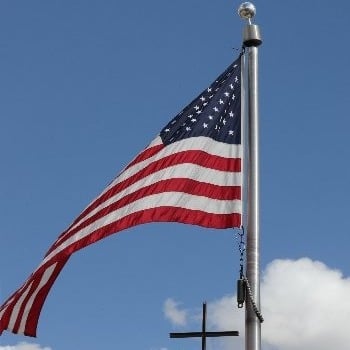-
 August 14, 2025By Jason Adkins, OSV NewsIn our era of war, drone strikes and simmering nuclear tensions, Catholics must bring the Gospel to bear on global affairs, not merely in prayer, but in policy, and hold their leaders accountable in doing so.
August 14, 2025By Jason Adkins, OSV NewsIn our era of war, drone strikes and simmering nuclear tensions, Catholics must bring the Gospel to bear on global affairs, not merely in prayer, but in policy, and hold their leaders accountable in doing so.
For too long, American foreign policy has been animated by a belief in "American exceptionalism" -- the idea that the United States is a singular, divinely favored nation destined to lead the world -- and a determination to preserve its role as the sole superpower in a unipolar world. Yet this vision, however noble it may sound to patriotic ears, has had devastating consequences: perpetual war, collapsed states, millions of lives lost and the ever-present specter of nuclear catastrophe.
Two Catholic thinkers, Patrick J. Buchanan and Andrew Bacevich, have issued prophetic critiques of this imperial orientation. Although differing in temperament and political perspectives (Buchanan from the right; Bacevich from a more centrist and scholarly perspective), both warn that the pursuit of American dominance not only betrays Christian moral teaching but also endangers the very world we claim to lead.
To understand why American foreign policy has become so reckless, one must first examine the myth that sustains it: that America is exceptional, a "city upon a hill," uniquely tasked with spreading democracy and freedom. This self-image often blinds policymakers to the limits of power, the sovereignty of other nations and the cost in human life of our military interventions. It creates a moral framework where U.S. actions, however violent, are always justified, while resistance is labeled as terrorism or tyranny.
This vision of global leadership is not rooted in humility but in hubris. In the nuclear age, such pride could lead not only to our fall, but to the annihilation of life on Earth.
Patrick J. Buchanan, a Catholic and longtime critic of interventionist foreign policy, has consistently warned against America's addiction to empire. In books such as "A Republic, Not an Empire," Buchanan argues that America's founders envisioned a nation dedicated to liberty at home, not military hegemony abroad.
Buchanan sees American exceptionalism not as a virtue but as a vice that leads to overreach and endless war. He opposed the Iraq War, the expansion of NATO, and the demonization of Russia and China, viewing them not as moral crusades but as provocations rooted in imperial ambition. His position is not pacifist, but deeply realist: He urges a return to national interest, regional diplomacy and restraint.
Catholics can draw from Buchanan's views a vision of foreign policy grounded in subsidiarity and just war teaching. War must always be a last resort, waged for legitimate defense -- not to impose ideological visions on unwilling nations.
Andrew Bacevich, a retired Army colonel and practicing Catholic, brings a sobering moral clarity to the discussion. A veteran of Vietnam and the father of a soldier killed in Iraq, Bacevich has lived the costs of empire. His books, including "The Limits of Power" and "America's War for the Greater Middle East," argue that America's drive for dominance is unsustainable, immoral and rooted in illusions about our power and virtue.
Bacevich critiques the bipartisan consensus that America must "lead" the world through force. He contends that this militarized global presence violates Catholic principles of peace, respect for human dignity and the pursuit of the common good. He calls instead for a foreign policy of humility, focused on diplomacy, development and respect for the sovereignty of other nations.
In today's emerging multipolar world where China, Russia, India and other nations assert growing influence, the United States' attempt to preserve unipolar supremacy is both futile and dangerous. As Pope Francis warned, we may already be living through a "piecemeal World War III," driven by ideological divisions, arms races and the erosion of diplomacy.
Catholics are called to be peacemakers. That means advocating for a multilateral foreign policy rooted in the Gospel: One that protects life, prioritizes the poor, respects other cultures and renounces war as a tool of domination. It means moving from a world ruled by force to one governed by dialogue and cooperation.
In an age of nuclear weapons and ecological strain, the stakes could not be higher. The voices of Buchanan and Bacevich are not simply conservative or contrarian, they are Catholic in the deepest sense. They remind us that no nation, however powerful, stands above God's law or the demands of justice.
Let us, as Catholics, heed these voices and work toward a world not ruled by empires, but united in peace.
